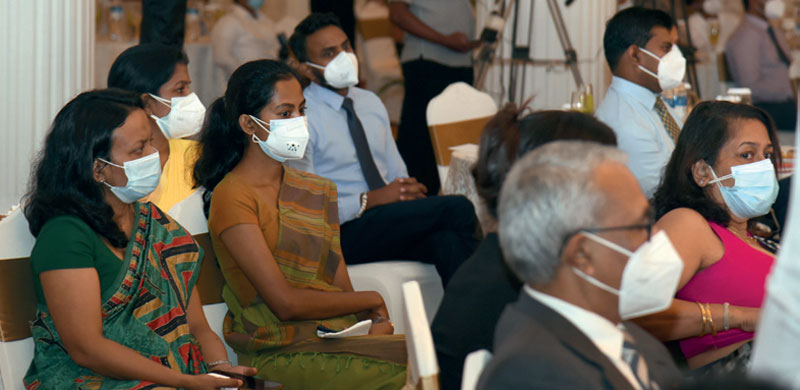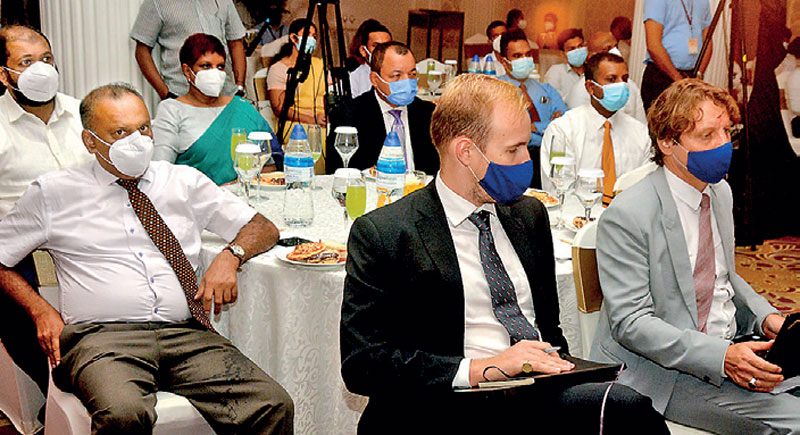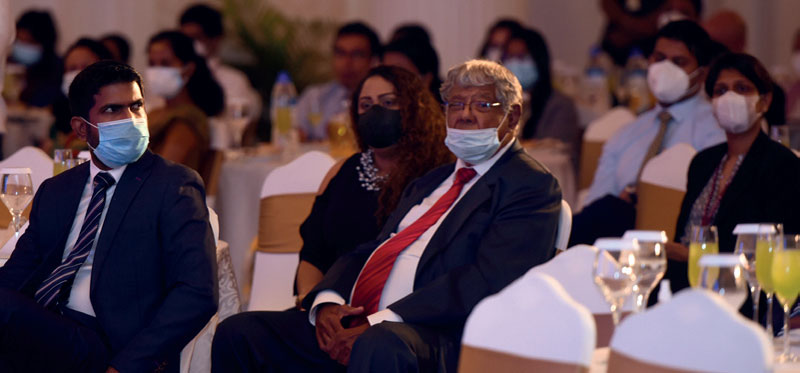Wednesday Feb 18, 2026
Wednesday Feb 18, 2026
Friday, 26 November 2021 00:22 - - {{hitsCtrl.values.hits}}
The key Government policy document saw mixed reactions from a range of prominent private sector representatives of international firms who spoke at the annual Daily FT-Colombo University MBA Alumni Association organised post-Budget Forum recently calling for more clarity in direction of its proposals and highlighted that success depends on being consistent policies as well as broader plans for macroeconomic stability
By Charumini de Silva
|
Central Bank Governor Ajith Nivard Cabraal
— Central Bank Governor Ajith Nivard —
— Central Bank Governor Ajith Nivard Cabraal — |
Top international firms operating in Sri Lanka are urging for policy consistency to encourage foreign direct investments (FDIs), and portfolio investor interest to make Sri Lanka more competitive and attractive, whilst the Central Bank Chief was confident the 2022 Budget will usher growth and stability aided by strong policy implementation.
Speaking at the first physical Post-Budget Forum jointly organised by the Daily FT and the University of Colombo MBA Alumni Association, the Central Bank Governor Ajith Nivard Cabraal emphasised that bold steps have been taken to steer the stability once again crippled by an unprecedented economic crisis due to COVID-19 pandemic.
“Budget 2022 is challenging because it was being prepared at a difficult time. We must also recognise the many bold steps taken to ensure clarity is maintained with no new burdens other than a few key ones imposed amidst the multiple challenges Government grapples with in the post-pandemic economic scenario,” Cabraal said.
The private sector leaders representing international companies were Standard Chartered Bank – Sri Lanka Executive Director and Head of Financial Institutions Lakshan Goonetilleke, CEAT Kelani Holdings Managing Director Ravi Dadlani, A. Baur & Co. Ltd. Managing Director/CEO Rolf Blaser, Airtel Sri Lanka Managing Director and CEO Ashish Chandra, SPAR Sri Lanka CEO Martin Schoeman, GSK Pharmaceuticals Country Head Sundar Ramachandran. Technical Partner PwC’s Director Tax Services Charmaine Tillekeratne and Capital Markets Partner/SC Securities CEO Roshantha Fernando also figured in the panel.
The Central Bank Chief was optimistic of stronger implementation of the policies which would assist the Government to foster growth in 2022.
“The element of difficulty in implementation of the policies put people away from it. These bold steps could be around for six or eight months, but we have every intention to ensure business returns to usual within the next nine months,” he said, adding that the Central Bank has already outlined the six-month stability and growth plan.
The Governor assured to work diligently to increase the Gross Domestic Product (GDP) of Sri Lanka to be $ 90 billion from the current $ 79 billion.
“I know it is a tall order, but these changes can be pursued diligently through the Budget 2022 and the Central Bank Road Map. We need the support of all the people, private sector and investors to steer growth,” he said.
Although some new taxes can be a temporary irritant, the Governor pointed out that almost every big company has made higher profits than the previous year due to the low-interest-rate regime continuing from 2020 to first half of 2021.
“I know it is tough for those whom that burden (taxes) has shifted. It is not the best sometimes as the private sector could perhaps be uncomfortable with these changes. But analysing the profits made by the large companies, it was evident that Rs. 330 billion has been saved by the private sector while Rs. 313 billion was saved by the Government sector by low-interest cost. Sometime, a portion of this needs to be given back to the society by form of taxes to ensure the platform is made stronger,” he said.
Cabraal also said the prime focus is to ensure macroeconomic fundamental stability, particularly for the rupee.
“If the dollar exchange rate were to depreciate to Rs. 220, like some people suggest, it will have an adverse impact of 10% on the currency, both in terms of imports and exports,” he said, adding that Sri Lanka imports around $ 20 billion and exports over $ 10 billion annually.
“I believe once stability is ensured within the next eight-nine months, then we could start adjusting those factors gently. Right now, we all need to understand and consolidate. I know it is difficult, even for the Government, with high spending,” he added.
The Governor, however, stressed that long-term benefits should be maintained, such as water and road development projects. “I think it is the balance which is difficult to make, but it is being taken care of,” he said.
Q & A
Q: Why weren’t any relief measures announced to address the soaring cost of living which is a key concern of the public?
Cabraal: Given the current pandemic situation the global price rise is phenomenal. It is very challenging right now and is causing a serious amount of anxiety among the general public. We have attempted to provide relief by passing on only the most limited amount. Unfortunately, in the current context of the global and local situation, I believe that is the maximum that could have been done.
Q: Why didn’t the Budget 2022 have specific policies to attract FDIs?
Cabraal: Although it was not specifically outlined in the Budget 2022, there are many incentives and opportunities already on the table via the Port City Commission Act and SEC Act, passed in Parliament a few months ago.
|
Standard Chartered Bank – Sri Lanka Executive Director and Head of Financial Institutions Lakshan Goonetilleke
– Standard Chartered Bank Sri Lanka Executive Director and Head of Financial Institutions Lakshan Goonetilleke – |
Q: Overall view on Budget 2022?
Goonetilleke: It is great to see the Government having a plan in terms of working towards reducing the Budget deficit and plans they want to implement. But we see it as more short term and no medium term plan, which is something that the institution investors are looking to hear from the Government and it is also being highlighted by the rating agencies.
The coming year, we are seeing expenses as flat, but in future years that is something we want to keep an eye on. Recurrent expenditure for the Government is around 74%, and what we have seen is when the Government fails to meet its revenue targets, its capital investments get slashed which leads to growth and investment challenges from the public sector being curtailed.
Around 72% of the new incremental revenue is coming from the Surcharge Tax and the Special Goods and Services Tax (SSGT). Looking back to the Super Gains Tax (SGT) and the Nation Building Tax (NBT) collection, my understanding is much lower than the Government’s projection. Thus, meeting these revenue targets for next year is going to be difficult, as public investment is the only option left for the Government to curtail.
Long-term funding plans are essential and that is something the banks are looking for and the industry clearly needs as it is creating foreign exchange problems with remittance flows being slowed down.
The large dependency for domestic funding is also creating its own challenges. The Central Bank printing the largest quantum this year and the heavy reliance on low interest rate regime have moved up as a result it has created an inflationary pressure. This is something the Government have to pay attention to in 2022 as they are funding the Budget through domestic means rather than international means.
Our recommendation is that they need to look at opening up and go to international long-term funding opportunities.
|
CEAT Kelani Holdings Managing Director Ravi Dadlani
— CEAT Kelani Holdings Managing Director Ravi Dadlani — |
Q: In terms of attracting FDIs, do you all see any significant change in terms of policy?
Goonetilleke: The Government is going on an export drive, and they have also put an ambitious number of $ 19 billion. However, looking at the Budget, it is more rural development than promoting FDIs and exports. We need more clarity to promote in those lines to have a steady inflow of foreign exchange.
Blaser: The most important element is the implementation of the policies in respect of the Budget. To increase manufacturing or exports, it is not only about the taxes and savings, it is about the environment, the policies and resources.
As far as our business is concerned in the fertiliser industry, the ‘Vistas of Prosperity and Splendour’ policy states that Sri Lanka was moving to a 100% organic agriculture over a period of 10 years. But the Government this year immediately banned chemical and petrochemical fertiliser — this is not entirely in line with the policy framework, which was stated to be executed over a 10-year timeline and it clearly mentioned having both chemical and organic fertilisers in the transition period. As businesses we are in a difficult and challenging position as we are not 100% clear on the intention of that sudden change. We welcome the sustainable development policy move, but to earn more export income through organic agri products, we need to align with the international standards.
This means we need 100% traceability of every input, process, storage, packaging and so on and so forth. If the idea is that if we consume all that organic products ourselves, we will not be able to apply those standards to maximise the output of the input — that is the total opposite of going in position. We are not 100% clear on the policy and its implications where we want to go.
Sri Lanka would have been in a better position to attract FDIs and manufacturing exports, if the country had the policies, standards and regulations harmonised with international standards because then it is much easier for our exports to be compliant and our imports will become cheaper. If we had harmonised standards and policies it would increase our activities in exports and imports, whilst also saving foreign exchange to import essential items.
Schoeman: Overall, the 2022 Budget is very short-term and revenue driven. It is a 50:50 in terms of whether it will attract significant FDIs with sustained regeneration of investors. I agree with the fertiliser policy, as our sales are coming from fruits, vegetables, and rice in the retail sector. We are heavily reliant on the supply of those. However, we see a lot of policy inconsistency around it, not only does it affect us financially, but in terms of what people can consume.
I think continued digitisation of the public sector is definitely a good move. Some of the relaxation of export and import rules are welcomed and we would like to see more details around those decisions. The Single Window system with regards to clearing our goods from Customs Department is a good move to have more transparency. I think it will be a very good advantage for us. The big positive is around renewable energy expansion, not only will it help on the costs but it will also allow to generate more employment. More jobs reflects an increased disposable cashflow for economic activities.
Inconsistent policies are costing heavily for the businesses, whilst it is also sending out bad signals for the external investors, which is disadvantageous for Sri Lanka which is looking to encourage more FDIs and investors.
Relief for the less-fortunate is something that was not discussed through the Budget.
The 25% Surcharge Tax on companies’ turnover exceeding Rs. 2 billion is also bit on the negative side as well.
What makes retails successful is a good flow of economic goods and logistics. Both these factors have been quite unfavourable for us.
We hope the foreign exchange crisis will be short term and that it will be sorted by the Q2 of next year.
Dadlani: I think clear clarification on policy direction is what matters most in bringing in any FDI. Any expansion or FDIs needs a gestation period for three to five years. We don’t see this kind of policy consistency and it keeps changing from Budget to Budget now. In terms of FDIs, there was no clarification on the areas where the Government needs them. If you need FDIs to come into this country, we also need access to other markets, as the Sri Lankan market is quite small. In that context, we also need to look and expand our bilateral agreements which can drive exports and have clear markets for FDIs.
Chandra: I agree that we need clarity on the reforms that will be introduced to bring in more FDIs to Sri Lanka. It is not always easy to come up with a Budget, given the economic challenges we are in post-pandemic. The 2022 Budget seems progressive. One key factor is that there is no abrupt taxation that has been introduced, except for a few taxes on Surcharge Tax and SGST. This gives the confidence to the external parties that the country will not deter from what it has committed to us.
Being a telecommunications company, it is very important that the country has now envisaged to invest heavily into infrastructure. It is something which is going to bring growth in the economy and most telecommunications companies operating in Sri Lanka, will then be benefitted by the resulting economic growth. Of the four big pillars, that the Government is going to be focused on digitalisation and I think this is an area the telco companies will play a large role and will reduce the cost of operating Government expenses and help increase revenue generation for both private and public sectors.
We are also waiting for a major change in our sector, which is going to be the spectrum auctions. This is one of the key decisions the telecommunication industry wants more details on. We have seen across the world that different countries have taken auctions in a very different manner. If the auction goes wild, the implications of it will be detrimental not only to the industry, but to the entire economy.
The quality of FDIs we attract is another key factor. We need to understand the strengths of Sri Lanka such as skilled manpower and geographical location. We need to capitalise on certain sectors to bring in the tech-based FDIs to Sri Lanka because I think that is where the next phase of development is going to come from. I would like to see what the Government is planning to do to attract more tech-based FDIs.
|
A. Baur & Co. Ltd. Managing Director/CEO Rolf Blaser
— A. Baur & Co. Ltd. Managing Director/CEO Rolf Blaser — |
Ramachandran: The 2022 Budget appears to be sending market friendly messages. As all of us in the industry understand the challenges when you have a lack of fiscal space. I support the broad themes around digitisation, the fact that we want to bring in more freelancers, create a conducive work environment for global nomads and I think it augurs well with the country. There is also a lot of emphasis on trading and manufacturing.
What is not clear to me is the competitive advantage at least in the healthcare and pharmaceutical industry, which I represent. It is not enough to say we are going to manufacture and therefore we are going to attract more investments. There needs to be clearly spelled out strategies such as who are you manufacturing for the local or international market as these involve very different consideration sets. If that is going to be the value proposition, I would like to see more specific callouts on what the Government is going to do to build human capital required to get there. Coming from India, I know as we have a very mature pharmaceutical industry — but it has taken decades of human capital to get there because they are long-term skill sets. This is not something that you can put some subsidies and offices in special economic zones and suddenly you want to grow the business.
There are close to 1,200 foreign companies in Sri Lanka. Before Sri Lanka goes into the value proposition for newer investments, I would like to understand what sort of an assessment has been made to ensure that the existing investors were taken care of. What is the cross-sell and the depth we have on those investments before we go out and actually look for new investments. This will be a key reflection of how effectively we have been able to leverage the investments that came in and create some actual value propositions for newer investments that want to come in.
We have been in Sri Lanka for over three decades, and manufacture locally as well. If I look at our history, the traction of new capital expenditure we have made on a three to five year cycle, in the past three-decades, is not significant.
The point is that Sri Lanka has more opportunity to leverage on the existing companies that are already here and use that as a very clear narrative to attract more investors.
|
Airtel Sri Lanka Managing Director and CEO Ashish Chandra
— Airtel Sri Lanka Managing Director and CEO Ashish Chandra —
|
Q: How long will Sri Lanka take to improve its sovereign rating, what could be done and can they do it in the next six to nine months?
Goonetilleke: It is a long-term exercise, but having said that there are two avenues right now. One is clearly the international debt market. To do that the Government has not gained enough credibility and sadly the only way the institution investors will consider reinvesting in Sri Lanka is through an IMF program because it is a more controlled program. It is not that the Government doesn’t know what they are doing, but they want a structured program to be followed. Policy consistency is something that the institution investors have been asking for.
Second option is the bilateral funding that the Government is exploring and which was also spelled out in the Central Bank Road Map. Oman credit line, the Indian facility — those are great, but we have not seen any clarity in terms of a fine timeline, when it is going to happen. From an institutional investor standpoint, that is something we are asking for. The Governor stated that they were on radio silence, there may be some challenges — but that silence is impacting the investor confidence.
I think the Government needs to verbalise where they are signing these agreements. The Central Bank Governor mentioned that they are working on a $ 3.5 billion foreign reserves target by year end and today we are at $ 2.3 billion and there are more coupon payments due. In terms of how the Government is going to bridge that is going to be very critical. The country is facing a foreign exchange shortage and the bridge between money exchangers and what banks are offering is between Rs. 20-30 and any panellist would relate to the challenges when they want to import goods. What the Government is planning to do to bridge this foreign exchange shortage is still not highlighted.
We hoped that there would be a marriage between the Central Bank Road Map and the 2022 Budget, but it wasn’t so — that kind of policy alignment is clearly what’s needed, from a corporation and banks perspective. Like I said before, funding is shorter and we would like to see more medium term plans — that is exactly what will give access to the international markets.
One other key fact is that remittances globally are going down. Bangladesh has had year-on-year (YoY) drop of 20%. We are relying on our remittances, while we are also waiting for tourism to rebound. It is reported that remittance flows are going through more informal channels because of the divide and that is also adding to the foreign exchange crisis. These are some of the areas that the Government has to take into consideration in managing and bring it back to the banking system.
The debt moratorium given to corporations and the public will be ending next year and that is something we need to closely monitor. In terms of the Non-Performing Loans (NPLs) in the banking industry.
|
SPAR Sri Lanka CEO Martin Schoeman
— SPAR Sri Lanka CEO Martin Schoeman — |
Q: Your view on Budget 2022 discouraging finished rubber imports?
Dadlani: From a rubber industry perspective, one positive is that we are looking at a production based economy. It doesn’t mean only the companies that exist here, but also the companies that are going to come. However, we have heard this kind of statements being made regularly and I can only wish that what has been said is planned through and with the intervention of the private sector, the relevant State institutes like the Export Development Board (EDB), Board of Investments (BOI) to take it forward. All stakeholders need to get involved to take it forward and I feel it is one good initiative.
Q: Prospects going forward?
Goonetilleke: Sustainability and environmental initiatives the Government is taking is a very positive step. That is something the banks would be very keen on participating in. Globally, we have seen countries, corporates, banks issuing green and blue bonds and it will be great to see Sri Lanka having that access — particularly in the renewable energy sector. Something that the banks want more clarity on and are insisting is Government access to international markets. This also means that local banks and corporate banks too have access to it. The sooner they get back into it and align with the rating agencies in terms of giving that access to the markets is something that is needed.
The Government is heavily dependent on Treasury bill auctions and as a result the borrowing costs are going up. This will impact the local economy from an inflation point of view as well as a higher cost to corporate and maybe even pushing out private sector investments because the Government is borrowing at a higher level.
Blaser: I’m not sure if Sri Lanka has a competitive advantage to attract FDIs particularly in the pharmaceutical industry or in the technology industry. However, Sri Lanka has a lot of competitive advantage in many other areas such as medical tourism or wellness tourism. This is an area which can immediately generate benefits and returns, unlike any other industry which requires a lot of infrastructure where investors have to wait for another five years to reap those benefits.
Sri Lanka can add more value to the traditional exports of tea, rubber and coconut. These are some of the low hanging fruits that can generate foreign exchange within a short span of time, given the current economic crisis.
In terms of agriculture, there is a huge potential to grow once we know the exact direction.
Sri Lanka is turning 2.8 million hectares of agricultural land into organic farming. This puts us at the top of the world of demand for organic inputs. We are going to be the biggest organic agriculture products. This is a very ambitious decision, but the implementation is the problem.
Organic agriculture is not only about fertiliser, it’s about crop rotation, biodiversity, irrigation, manure, seed management — it is an ecosystem. This is a big opportunity if Sri Lanka can make it a success, but we have to go hand-in-hand. The Government needs to clearly spell it out from now on where to go and how to go.
|
GSK Pharmaceuticals Country Head Sundar Ramachandran
— GSK Pharmaceuticals Country Head Sundar Ramachandran —
|
Ramachandran: You have a market which has no competitive intensity — that from a business point of view translates into a decent return of capital. Now what you need to balance is the whole focus on local manufacturing coupled with price controls. What often happens is, you don’t want price control which is with the right intent manifesting itself in terms of a road block for innovation. What are the incentives for innovative companies to bring new molecules and new brands into the market for the patients in Sri Lanka? So, you must have that right balance of creating an environment where foreign multinationals can bring innovative drugs to the market.
From a manufacturing standpoint, you can further market it. Who are you making it for and then the value proposition can be expanded. I would argue that most companies may not necessarily only look at the market, but could you actually look at Sri Lanka being part of a broader portfolio optimisation strategy for markets like India. If I’m a large Indian generic manufacturer, I have the opportunity to go and put a plant in any part of the country or I could set up a factory in one of the coastal areas in Sri Lanka. Those are some of the strategic investments in terms of manufacturing.
Be clear on the value proposition and talk differently to target segments. It should not be a blanket approach.
The only factor that worries me is the price control because then it allows us to bring in the best drugs into the market to treat the patients in Sri Lanka. This is what all multinational pharmaceutical companies intend to do ultimately.
We continue to be bullish on the country, which is a combination and we saw some consistency in the way the Government has worked with us. I think there is still an opportunity in the middleware and the backend. In the pharmaceutical industry, we still have to run from pillar to post to get registration done and to get import license done. The regulator digitised the entire records and we all know what happened thereafter. So, three steps forward and four steps backwards.
The entire digitisation on how the Government and the regulatory ecosystems deal with business has to be robust and transparent. It is a huge area of opportunity that we see. Pricing flexibility is the other factor as the market size is small so I can achieve some value growth. The Government needs to be appreciative, understand and have regular conversation with the business in the pharmaceutical industry. If those come around, I think we will continue to be bullish within the country and committed to serving the patients in Sri Lanka.
Schoeman: Although supermarket businesses have a high turnover, it has a very low margin. We believe development in manufacturing in the country will enhance employment which will then be reflected in high spending.
Supermarkets are a net importer, but we have been investigating channels to export Sri Lankan products through our business network to China, Europe and South Africa. As you all know, we are in partnership with CBL Group — one of the leading food conglomerates in the country. We have now coupled with them to talk to our partners worldwide in 47 countries that SPAR supermarkets are operating in. It is also good for us in generating foreign exchange. These are some of the large benefits we see in the short term.
Dadlani: The concern is the additional incremental 2.5% tax introduced. We don’t have a problem being what it is, but we need more clarity around it. We need details on whether the retails are going to be involved, cascading effect on the distribution business.
There is also a thought process of the removal of the para tariffs, which extends to about 400-600 items. We are not very clear whether the removal of para tariffs are detached or aligned with the production economy that the Government is talking about. If we are going in for a production economy while attracting FDIs with no policy alignment, it will make a big difference in what we plan in the longer term.
One other subject we would like the Government’s focus on, which was not mentioned in the Budget is raw rubber. It is a key component in the rubber industry and we would like the Government to bring in policy if we need to move on. Given the current context, I would not be surprised if Sri Lanka becomes a net raw rubber importer in the next two to three years, rather than a rubber exporter. Sri Lanka needs around 140 mn/kgs of raw rubber for annual production, but today we harvest only 78 men/kgs of raw rubber locally.
Chandra: Looking at the figures of the last 18 months, the modesty of telecommunications in our lives have exemplified beyond comparison — right from education to banking to every industry which is residing on telecommunication. Statistics say that every 10% in the broadband mobile penetration leads to nearly 2% growth in the GDP. In terms of Sri Lanka, we have about 22 million people and have 30 million mobile phones, but only 50% of them use broadband or high-speed connectivity.
The growth in the telecommunication industry is not going to come from more consumers, as we already have over 135% mobile penetration. The growth is going to be generated through the value added services, which is going to drive over the infrastructure that’s been created already. The past 18 months has been a fast-forward for the telecommunication industry. A lot of investment has happened in the past two years. The data consumption has doubled in this particular time frame, as most of us be it students, professionals or businessmen – were relying on the technology in the pandemic. During the last year, a lot of investments were made by my company and other firms. We upgraded our entire network to a world-class 4G.
One big focus of the telecommunication industry and the Government has to ensure that the service reaches every citizen of the country and there are multiple initiatives and some of them were outlined in the Budget too such as the 10,000 schools to be connected fibre optic cables. We are also running a program on ‘Gamata Sannivedanaya,’ an initiative of the Telecommunication Regulatory Commission (TRC) — where every non-connected village in the country is getting connected with companies putting up towers.
The second big factor is that all these telecommunications need to be provided at a very affordable price. If the last mile consumer is not able to afford the high-speed broadband, the economy will not be able to unleash its potential. This is what the entire industry is currently working on.
Thirdly, these progressive moves of investments and affordability of services should not get disturbed with any abrupt policies through taxes. I’m stunned to see that SGST where telecommunication has been clubbed with betting, alcohol, cigarettes as an industry — probably the only sector with non-luxury and maybe in current context a ‘necessary industry’. But I think it is mainly done to simplify the taxes. Currently in telecommunication, we pay three taxes. One concern we have on the SGST regime is that we get a lot of VAT input.
The telecommunication of tomorrow is going to be decided by the 5G that is going to come up in Sri Lanka. The 5G is dependent on the spectrum given by TRC to the telco firms. Till now, the spectrums were allocated by the TRCSL to different operators through reasonable prices, depending on the demand required by a particular firm. Through the 2022 Budget proposal, we are now moving from an allocated based spectrum to an auction based scheme. We have seen in the world and even in the region like Bangladesh and India, if the pricing of a spectrum is not done right — it can be very detrimental to the economy. We are hoping that the reserve prices of the spectrums are going to be reasonable and I think the Government will ensure it to all operators — big or small. If the pricing of the spectrum is too high it will either lead to monopolisation of the services or like in India the reserve prices were so high that the entire spectrum remained unsold. The Government targets of getting the revenue from the sale of the spectrum didn’t happen.
Looking at how TRCSL in the past worked, we are confident that the spectrum auction will be favourable for the telecommunication industry.
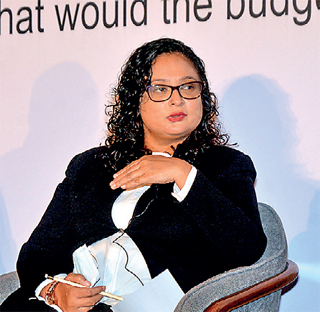
PwC’s Director Tax Services Charmaine Tillekeratne
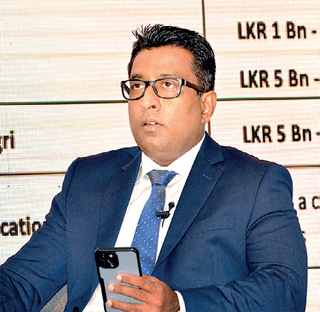
SC Securities CEO Roshantha Fernando
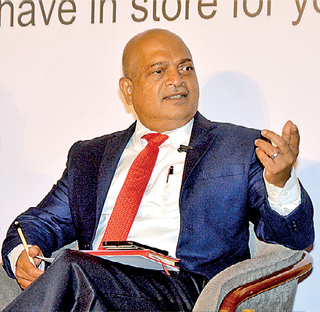
Daily FT Editor-in-Chief and CEO Nisthar Cassim (Moderator)
Pix by Upul Abayasekara and Ruwan Walpola
CSE remains attractive compared to regional markets: SC Securities
With the Budget 2022 benefiting several sectors amidst favourable policy and political environment, Sri Lanka’s capital market remains attractive compared to others in the region, a top broking firm executive revealed. |


